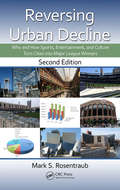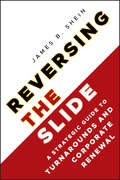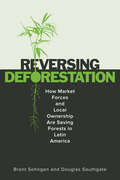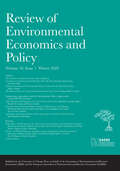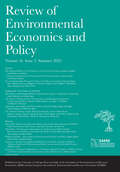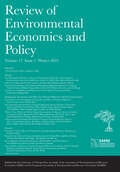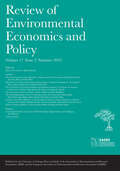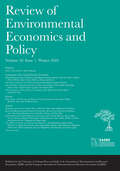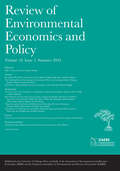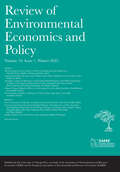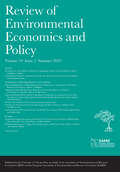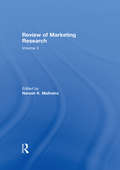- Table View
- List View
Reversing Course on a Reverse E-Auction (A)
by James K. Sebenius Alex Green Kym Lew NelsonGlobal consumer products powerhouse LSP has found enormous savings in a trial run of a new competitive bidding tool for their procurement organization known as a reverse e-auction. But when Jen Baldwin is asked to achieve the same savings from her suppliers for a product used by her own division, things turn out to be much more complex, revealing the benefits and drawbacks of using the tool to reduce prices, maintain supplier relationship and garner savings for the company.
Reversing Course on a Reverse E-Auction (B)
by James K. Sebenius Alex Green Kym Lew NelsonGlobal consumer products powerhouse LSP has found enormous savings in a trial run of a new competitive bidding tool for their procurement organization known as a reverse e-auction. But when Jen Baldwin is asked to achieve the same savings from her suppliers for a product used by her own division, things turn out to be much more complex, revealing the benefits and drawbacks of using the tool to reduce prices, maintain supplier relationship and garner savings for the company.
Reversing Course on a Reverse E-Auction (C)
by James K. Sebenius Alex Green Kym Lew NelsonGlobal consumer products powerhouse LSP has found enormous savings in a trial run of a new competitive bidding tool for their procurement organization known as a reverse e-auction. But when Jen Baldwin is asked to achieve the same savings from her suppliers for a product used by her own division, things turn out to be much more complex, revealing the benefits and drawbacks of using the tool to reduce prices, maintain supplier relationship and garner savings for the company.
Reversing Course on a Reverse E-Auction (D)
by James K. Sebenius Alex Green Kym Lew NelsonGlobal consumer products powerhouse LSP has found enormous savings in a trial run of a new competitive bidding tool for their procurement organization known as a reverse e-auction. But when Jen Baldwin is asked to achieve the same savings from her suppliers for a product used by her own division, things turn out to be much more complex, revealing the benefits and drawbacks of using the tool to reduce prices, maintain supplier relationship and garner savings for the company.
Reversing Racism
by Uche EkezieThis book is written to tackle what in recent times has become a significant issue when equity in multiracial settings is being discussed, especially as globalization continues to encourage diversity and inclusion around the world. It begins, like most books on the subject, by giving the reader a view of the different expressions of racism; and as the reader progresses, the book provides suggestions on what victims of racism can do collectively on their part to proactively reverse circumstances that invite racism. The book’s intent is not to exacerbate racial tensions; instead it is a call to positive action that can roll back the symptoms which perpetuate racism with an action plan that aims to reduce its manifestations in society. It is a gathering of the authors thoughts on what minorities in the West and people of African descent, as the main victims of racism can do to subtly address the traits that encourage racists’ behavior. In writing this book the author hopes to galvanize readers into undoing the social structures that ensure people of color remain economically and socially disadvantaged and thus easy prey for racists. It is of course based on his personal experiences and thoughts on the subject; hence, there might be points with which some readers may differ in opinion. To better appreciate what these experiences are, the book begins with a little background on the author, before delving into the subject matter in the subsequent chapters. The author has made the book as condensed as possible by not overelaborating the points raised. It is a light read, with language simple and easy for the lay as well as the scholarly to understand. This way every kind of reader can appreciate it, even those who do not like voluminous books can get through it in a day or two. So, please go ahead and enjoy this brave foray into the sensitive subject of racism.
Reversing Urban Decline: Why and How Sports, Entertainment, and Culture Turn Cities into Major League Winners, Second Edition
by Mark S. RosentraubDetroit‘s bankruptcy is the most severe example of the financial implications of the movement of wealth to the suburbs. When residents and businesses leave, central cities have a disproportionate share of most regions lower-income households. At the same time, many central cities collect less revenue as states cut financial support. So, we are lef
Reversing the AMD Fusion Launch
by Ryan Johnson Elie OfekAMD management needs to make a critical decision on the launch sequence of its next-generation technology called Fusion. The Fusion processor concept merges the central and graphics processing units (CPU and GPU) onto one chip-- yielding advantages in performance (particularly graphics related), power consumption, and suitability for new computer form factors (tablets, all-in-one machines, etc.). AMD planned to launch Fusion at the beginning of 2011 with a high-end processor, code-named Llano, to impress the industry and consumers with the best the technology could offer (suited for high-end desktops and notebooks), and subsequently to launch low-powered versions, code-named Brazos (suited for small notebooks and netbooks). However, the development of Llano suffered delays while that of Brazos was ahead of schedule. AMD's executive committee raised the possibility of reversing the launch sequence and going with a "Brazos First" strategy. The case describes the microprocessor industry, its main competitors (AMD and Intel), and the evolving world of PC selling and buying. The case further provides a host of market research that AMD conducted to better understand the market. Students need to address the advisability of a reverse launch vs. waiting to launch all versions together and whether AMD can advance its competitive position relative to Intel with Fusion. Students need to outline their marketing approach (sales effort, pricing, consumer marketing, etc.) in the event that a reverse launch strategy is pursued.
Reversing the Slide
by James B. SheinA just-in-time guide for revamping distressed companiesDrawn from the author's decades of experience advising, purchasing, and reviving distressed companies across industries, geographies, and sizes, Reversing the Slide is designed to help executives, managers, and employees revitalize downtrodden companies. It shows how to: select the tactics appropriate for each stage of distress; understand the use of entrepreneurial concepts; avoid pitfalls common to turnarounds; determine the legal, financial, strategic, and operational steps in the process; discover why the principal of "ready, fire, aim" should guide the decision-making process in situations with time pressure and significant uncertainty; and uncover the secrets of effective leadership and governance.Contains step-by-step instructions for helping troubled organizations bounce back with vigorOften quoted in the Wall Street Journal, the author is an authority on restructuring and downsizingOffers a handbook for implementing a successful corporate turnaroundJames Shein's Reversing the Slide is full of insightful advice on what works, what does not, and why it will prove invaluable to executives, managers, and employees in helping troubled companies before it's too late.
Reversing Deforestation: How Market Forces and Local Ownership Are Saving Forests in Latin America
by Douglas Southgate Brent SohngenDire reports of surging deforestation in the Brazilian Amazon appear often in international headlines, with commentators decrying the destruction of tree-covered habitats as an act of environmental vandalism. Although forest losses are alarming, broader trends are bending in the direction of forest recovery. In this book, Brent Sohngen and Douglas Southgate address the long-term recovery of forests in Latin America. The authors synthesize trends in demography, agricultural development, and technological change, and argue that slower population growth and increasing crop and tree yields—in conjunction with protecting local ownership of natural resources—have encouraged forest transition. This book explores how market forces, ownership arrangements, and the enforcement of property rights have influenced this shift from net deforestation to net afforestation. Forest transitions have happened before, such as the recovery of tree-covered habitats in Europe and the United States. Signs of a similar transformation in land use are now present in Latin America. Ending deforestation requires a strengthening of forest dwellers' property rights while ensuring that biodiversity conservation is no longer treated as a value-less externality. The resulting forest landscape, actively managed for ecosystem services, will be more resilient, as is needed to overcome climate change.
Review Your Business Comprehensively: Monitoring and Revising Your Analytical Models as the Business--or Business Environment--Changes
by Thomas H. Davenport Jeanne G. Harris Robert MorisonBeing analytical - or more specifically, being successful with analytics - is not a one-time activity. Analytical competitors must constantly review and revise their approaches in light of their business strategies and business models, changing market conditions, competitor initiatives, and the expectations and behaviors of customers. These days the world changes rapidly, and analytical models need to reflect those changes. In this chapter the authors of the groundbreaking Competing on Analytics discuss how to monitor and review your analytical processes and models to ensure that they stay in sync with changing business conditions. Just as your competition, technology, and customers change, so too should your analytical models. This chapter was originally published as Chapter 9 of Analytics at Work: Smarter Decisions, Better Results.
Review of Environmental Economics and Policy, volume 16 number 1 (Winter 2022)
by Review of Environmental Economics and PolicyThis is volume 16 issue 1 of Review of Environmental Economics and Policy. The Review of Environmental Economics and Policy (REEP) is an official journal of the Association of Environmental and Resource Economists and the European Association of Environmental and Resource Economists. REEP publishes symposia, articles, and regular features that contribute to one or more of the following goals: to identify and synthesize lessons learned from recent and ongoing environmental economics research; to provide economic analysis of environmental policy issues; to promote the sharing of ideas and perspectives among the various sub-fields of environmental economics; to strengthen the linkages between environmental economics research and environmental policy; to encourage communication and connections between academics and the wider policy community; to offer suggestions for future research; to provide insights and readings for use in the classroom; to address issues of interest to the environmental economics profession.
Review of Environmental Economics and Policy, volume 16 number 2 (Summer 2022)
by Review of Environmental Economics and PolicyThis is volume 16 issue 2 of Review of Environmental Economics and Policy. The Review of Environmental Economics and Policy (REEP) is an official journal of the Association of Environmental and Resource Economists and the European Association of Environmental and Resource Economists. REEP publishes symposia, articles, and regular features that contribute to one or more of the following goals: to identify and synthesize lessons learned from recent and ongoing environmental economics research; to provide economic analysis of environmental policy issues; to promote the sharing of ideas and perspectives among the various sub-fields of environmental economics; to strengthen the linkages between environmental economics research and environmental policy; to encourage communication and connections between academics and the wider policy community; to offer suggestions for future research; to provide insights and readings for use in the classroom; to address issues of interest to the environmental economics profession.
Review of Environmental Economics and Policy, volume 17 number 1 (Winter 2023)
by Review of Environmental Economics and PolicyThis is volume 17 issue 1 of Review of Environmental Economics and Policy. The Review of Environmental Economics and Policy (REEP) is an official journal of the Association of Environmental and Resource Economists and the European Association of Environmental and Resource Economists. REEP publishes symposia, articles, and regular features that contribute to one or more of the following goals: to identify and synthesize lessons learned from recent and ongoing environmental economics research; to provide economic analysis of environmental policy issues; to promote the sharing of ideas and perspectives among the various sub-fields of environmental economics; to strengthen the linkages between environmental economics research and environmental policy; to encourage communication and connections between academics and the wider policy community; to offer suggestions for future research; to provide insights and readings for use in the classroom; to address issues of interest to the environmental economics profession.
Review of Environmental Economics and Policy, volume 17 number 2 (Summer 2023)
by Review of Environmental Economics and PolicyThis is volume 17 issue 2 of Review of Environmental Economics and Policy. The Review of Environmental Economics and Policy (REEP) is an official journal of the Association of Environmental and Resource Economists and the European Association of Environmental and Resource Economists. REEP publishes symposia, articles, and regular features that contribute to one or more of the following goals: to identify and synthesize lessons learned from recent and ongoing environmental economics research; to provide economic analysis of environmental policy issues; to promote the sharing of ideas and perspectives among the various sub-fields of environmental economics; to strengthen the linkages between environmental economics research and environmental policy; to encourage communication and connections between academics and the wider policy community; to offer suggestions for future research; to provide insights and readings for use in the classroom; to address issues of interest to the environmental economics profession.
Review of Environmental Economics and Policy, volume 18 number 1 (Winter 2024)
by Review of Environmental Economics and PolicyThis is volume 18 issue 1 of Review of Environmental Economics and Policy. The Review of Environmental Economics and Policy (REEP) is an official journal of the Association of Environmental and Resource Economists and the European Association of Environmental and Resource Economists. REEP publishes symposia, articles, and regular features that contribute to one or more of the following goals: to identify and synthesize lessons learned from recent and ongoing environmental economics research; to provide economic analysis of environmental policy issues; to promote the sharing of ideas and perspectives among the various sub-fields of environmental economics; to strengthen the linkages between environmental economics research and environmental policy; to encourage communication and connections between academics and the wider policy community; to offer suggestions for future research; to provide insights and readings for use in the classroom; to address issues of interest to the environmental economics profession.
Review of Environmental Economics and Policy, volume 18 number 2 (Summer 2024)
by Review of Environmental Economics and PolicyThis is volume 18 issue 2 of Review of Environmental Economics and Policy. The Review of Environmental Economics and Policy (REEP) is an official journal of the Association of Environmental and Resource Economists and the European Association of Environmental and Resource Economists. REEP publishes symposia, articles, and regular features that contribute to one or more of the following goals: to identify and synthesize lessons learned from recent and ongoing environmental economics research; to provide economic analysis of environmental policy issues; to promote the sharing of ideas and perspectives among the various sub-fields of environmental economics; to strengthen the linkages between environmental economics research and environmental policy; to encourage communication and connections between academics and the wider policy community; to offer suggestions for future research; to provide insights and readings for use in the classroom; to address issues of interest to the environmental economics profession.
Review of Environmental Economics and Policy, volume 19 number 1 (Winter 2025)
by Review of Environmental Economics and PolicyThis is volume 19 issue 1 of Review of Environmental Economics and Policy. The Review of Environmental Economics and Policy (REEP) is an official journal of the Association of Environmental and Resource Economists and the European Association of Environmental and Resource Economists. REEP publishes symposia, articles, and regular features that contribute to one or more of the following goals: to identify and synthesize lessons learned from recent and ongoing environmental economics research; to provide economic analysis of environmental policy issues; to promote the sharing of ideas and perspectives among the various sub-fields of environmental economics; to strengthen the linkages between environmental economics research and environmental policy; to encourage communication and connections between academics and the wider policy community; to offer suggestions for future research; to provide insights and readings for use in the classroom; to address issues of interest to the environmental economics profession.
Review of Environmental Economics and Policy, volume 19 number 2 (Summer 2025)
by Review of Environmental Economics and PolicyThis is volume 19 issue 2 of Review of Environmental Economics and Policy. The Review of Environmental Economics and Policy (REEP) is an official journal of the Association of Environmental and Resource Economists and the European Association of Environmental and Resource Economists. REEP publishes symposia, articles, and regular features that contribute to one or more of the following goals: to identify and synthesize lessons learned from recent and ongoing environmental economics research; to provide economic analysis of environmental policy issues; to promote the sharing of ideas and perspectives among the various sub-fields of environmental economics; to strengthen the linkages between environmental economics research and environmental policy; to encourage communication and connections between academics and the wider policy community; to offer suggestions for future research; to provide insights and readings for use in the classroom; to address issues of interest to the environmental economics profession.
Review of Management Accounting Research
by Magdy G. Abdel-KaderA comprehensive review of contemporary research in management accounting. Provides a thorough critical analysis of recent issues published in the management accounting literature and identifies gaps for future research in each issue reviewed.
Review of Marketing Research: Volume 1
by Naresh MalhotraFirst Published in 2017. Routledge is an imprint of Taylor & Francis, an Informa company.
Review of Marketing Research: Volume 2
by Naresh MalhotraFirst Published in 2017. Routledge is an imprint of Taylor & Francis, an Informa company.
Review of Marketing Research: Volume 3
by Naresh MalhotraFirst Published in 2017. Routledge is an imprint of Taylor & Francis, an Informa company.
Review of Marketing Research: Volume 4
by Naresh MalhotraFirst Published in 2017. Routledge is an imprint of Taylor & Francis, an Informa company.
Review of Marketing Research: Volume 5
by Naresh MalhotraFirst Published in 2017. Routledge is an imprint of Taylor & Francis, an Informa company.
Review of Marketing Research: Volume 6
by Naresh K Malhotra"The Review of Marketing Research" series provides current, state-of-the-art articles by the marketing field's leading researchers and scholars. Unlike other research publications in the field, which impose major constraint on article length, RMR publishes longer chapters that are not only theoretically rigorous but also offer richer detail, including literature reviews, cutting-edge methodologies, empirical studies, international developments, guidelines for implementation, and suggestions for future theory development and testing. "The RMR" series is edited by Naresh K. Malhotra along with a distinguished editorial review board. Each contribution undergoes a double-blind review process, and each volume represents an across-the-board view of the full range of current marketing research methodologies.


